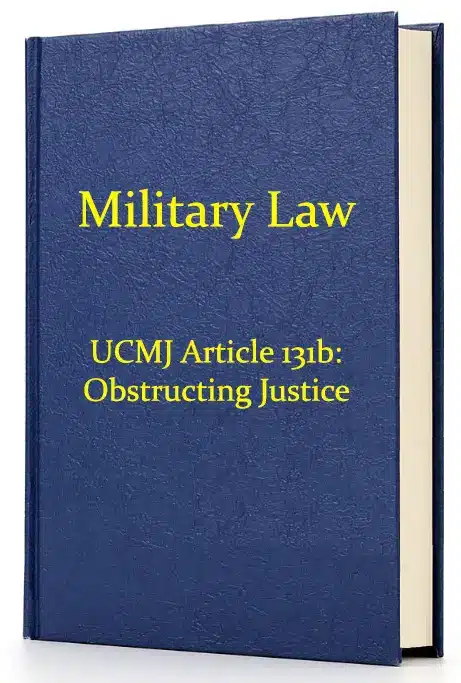The MCM states any service member may be subject to prosecution under Article 131b if they engage in conduct in the case of a particular person against whom the accused had reason to believe there were or would be criminal or disciplinary proceedings pending, with intent to influence, impede, or otherwise obstruct the due administration of justice.
To be convicted for obstructing justice, the prosecution must demonstrate that:
-
the accused wrongfully did a particular act;
-
the accused did so in the case of a particular person against whom the accused had reason to believe there were or would be criminal or disciplinary proceedings pending; and
-
the act was done to influence, impede, or otherwise obstruct the due administration of justice.
Understanding Article 131b (Obstructing Justice) of the UCMJ
This offense may be based on conduct that occurred before the referral of charges. Actual obstruction of justice is not an element of this offense. Criminal proceedings include general court-martial-lawyer, special court-martial-lawyer, and all other criminal proceedings. For the purposes of this paragraph, disciplinary proceedings include summary court-martial and nonjudicial punishment proceedings under Part V of the MCM. Examples of obstruction of justice include wrongfully influencing, intimidating, impeding, or injuring a witness, a person acting on charges under this chapter, a preliminary hearing officer, or a party; and using bribery, intimidation, misrepresentation, or force or threat of force delaying or preventing communication of information relating to a violation of any criminal statute of the United States to a person authorized by a department, agency, or armed force of the United States to conduct or engage in investigations or prosecutions of such offenses; or endeavoring to do so.
Maximum Possible Punishment for Violations of Article 131b
Service members convicted of violating Article 131b for obstructing justice face the maximum possible punishment of a dishonorable discharge, forfeiture of all pay and allowances, and confinement for five years.
How do you defend against Article 131b Obstructing Justice charges?
When facing the combined resources of the military and the current cultural climate, you need to be prepared to defend your career and your freedom. Crisp and Associates, LLC has a team of experienced trial attorneys with over 75 years of combined experience who have won these cases. This team includes the firm’s founder, Jonathan Crisp, a highly respected and sought-after attorney, speaker, and lecturer who has served in the U.S. Army Judge Advocate General’s Corps (JAG) since 1998 and entered private practice in 2007.
If you, or someone you know, is facing Article 131b charges for Obstructing Justice, you need to speak with a Military defense attorney immediately. We understand what is at risk and know how to protect your career, freedom, and future.




